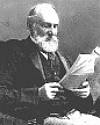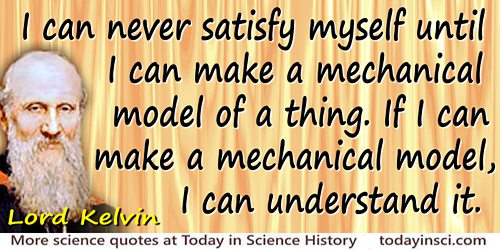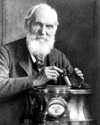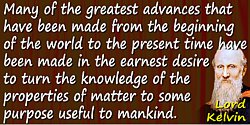 (source)
(source)
|
Baron William Thomson Kelvin
(26 Jun 1824 - 17 Dec 1907)
Irish physicist, mathematician and engineer , born as William Thomson in Ireland, he became an influential physicist, mathematician and engineer who has been described as the Newton of his era.
|
William Thomson Kelvin
“Make a mechanical model”
Illustrated Quote - Medium (500 x 250 px)
More William Thomson Kelvin quotes on science >>
In 1884, Lord Kelvin was invited to give a series of lectures of Johns Hopkins University in Baltimore in the United States. This quote comes from Lecture 20. A stenographic report was made of it by A.S. Hathaway, a Fellow in mathematics there. The words may not be a verbatim version of the words that Kelvin actually spoke (see footnote). Copies of these notes were reproduced by the “papyrograph” process, and made available to the attendees after his lectures.
It was not until twenty years later that Kelvin published a printed version, Lord Kelvin’s Baltimore Lectures on Molecular Dynamics and the Wave Theory of Light, in 1904. This later book was editted, and the remark forming the quote was not included in the typeset version. The words as they were down set down in the original handwritten notes by Hathaway concerned Kelvin's misgivings about the electromagnetic theory developed by his contemporary, James Clerk Maxwell.
“I can never satisfy myself until I can make a mechanical model of a thing. If I can make a mechanical model I can understand it. As long as I cannot make a mechanical model all the way through I cannot understand, and that is why I cannot get* the electromagnetic theory. I firmly believe in an electromagnetic theory of light, and that when we understand electricity and magnetism and light we shall see them ail together as parts of the whole. But I want to understand light as well as I can, without introducing things that we understand even less of. That is why I take plain dynamics. I can get a model in plain dynamics; I cannot in electromagnetics. But so soon as we have rotators to take the part of magnets, and something imponderable to take the part of magnetism, and realise by experiment Maxwell’s beautiful ideas of electric displacements and so on, then we shall see electricity, magnetism, and light closely united and grounded in the same system.”
Kelvin’s belief in models from the view of the present day shows how he held too closely to his idea of the utility of mechanical models, trying to explain phenomena that need modern electromagnetic and quantum theories. For example, to pursue his “vortex” hypothesis of the atomic structure of matter, he experimented with smoke rings. He also tried various models for the hypothetical (but in fact non-existent) luminferous ether.
* Notice the word “get” in the context above is an Americanism. Kelvin might have been more likely to say “accept.” This is a clue that the words Hathaway has left us may not be verbatim, though the sense will be a fair expression of Kelvin’s thoughts on the matter.
- Science Quotes by Baron William Thomson Kelvin.
- 26 Jun - short biography, births, deaths and events on date of Kelvin's birth.
- Lord Kelvin Biography - one of the earliest pages written for this site.
- A Kelvin Biography - with more background on Kelvin’s early scholarship in mathematics and his life’s work, from Famous Men of Science.
- William Thomson Kelvin - context of quote “Make a mechanical model” - Large image (800 x 400 px)
- William Thomson Kelvin - context of quote “Many of the greatest advances” - Medium image (500 x 250 px)
- William Thomson Kelvin - context of quote “Many of the greatest advances” - Large image (800 x 400 px)
- William Thomson Kelvin - context of quote “The rewards of accurate measurement” - Medium image (500 x 250 px)
- William Thomson Kelvin - context of quote “The rewards of accurate measurement” - Large image (800 x 400 px)
- William Thomson Kelvin - context of quote “I have no satisfaction in formulas” - Medium image (500 x 250 px)
- William Thomson Kelvin - context of quote “I have no satisfaction in formulas” - Large image (800 x 400 px)
- William Thomson Kelvin - context of quote “Mathematics is … etherealisation of common sense” - Medium image (500 x 250 px)
- William Thomson Kelvin - context of quote “Mathematics is … etherealisation of common sense” - Large image (800 x 400 px)
- William Thomson Kelvin - context of quote “Measure … and express in numbers” - Medium image (500 x 250 px)
- William Thomson Kelvin - context of quote “Measure … and express in numbers” - Large image (800 x 400 px)
- William Thomson Kelvin - context of quote “Imaginary difficulty of making a change” - Medium image (500 x 250 px)
- William Thomson Kelvin - context of quote “Imaginary difficulty of making a change” - Large image (800 x 400 px)
- William Thomson Kelvin - context of quote “Questions of personal priority” - Medium image (500 x 250 px)
- William Thomson Kelvin - context of quote “Questions of personal priority” - Large image (800 x 400 px)
- William Thomson Kelvin - context of quote “Science is not antagonistic to religion” - Medium image (500 x 250 px)
- William Thomson Kelvin - context of quote “Science is not antagonistic to religion” - Large image (800 x 400 px)
- William Thomson Kelvin - context of quote “Simplification of modes of proof” - Medium image (500 x 250 px)
- William Thomson Kelvin - context of quote “Simplification of modes of proof” - Large image (800 x 400 px)
- William Thomson Kelvin - context of quote “Mathematics is the only true metaphysics” - Medium image (500 x 250 px)
- William Thomson Kelvin - context of quote “Mathematics is the only true metaphysics” - Large image (800 x 400 px)
- Excellent Kelvin Biography history at the BBC education site for the Local Heroes TV series.
- Construction details for "Kelvin's Thunderstorm" - Lord Kelvin's water-drop electrostatic generator..
- Kelvin at three different ages - a photo gallery across his life.
- Collection of pictures of Kelvin at different ages - at the MacTutor site.
- Informative Biography of Kelvin - with additional resources at the MacTutor site.
- History of Submarine Cables - a 150 Year History of Submarine Cables.
- Timeline of Atlantic Cables - 1856 to 2015.
- Lord Kelvin's Conjecture Disproved - A modern improvement on Kelvin's 1887 geometrical conjecture.
- Degrees Kelvin: A Tale of Genius, Invention, and Tragedy, by David Lindley. - book suggestion.
- Booklist for William Thomson.









